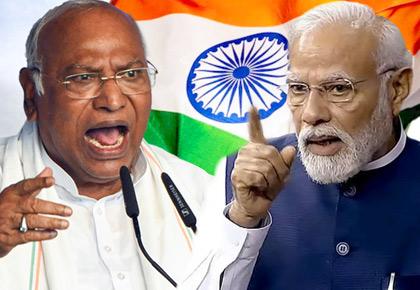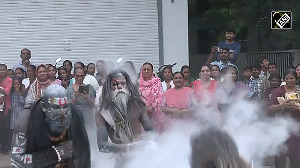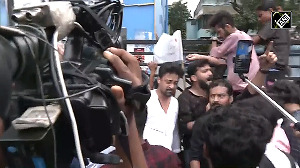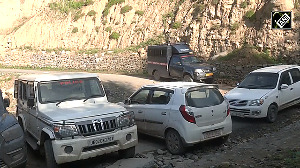'In India, political parties want to portray their leaders as cinematic heroes critical of their opponents.'
'This is where memes come into play.'
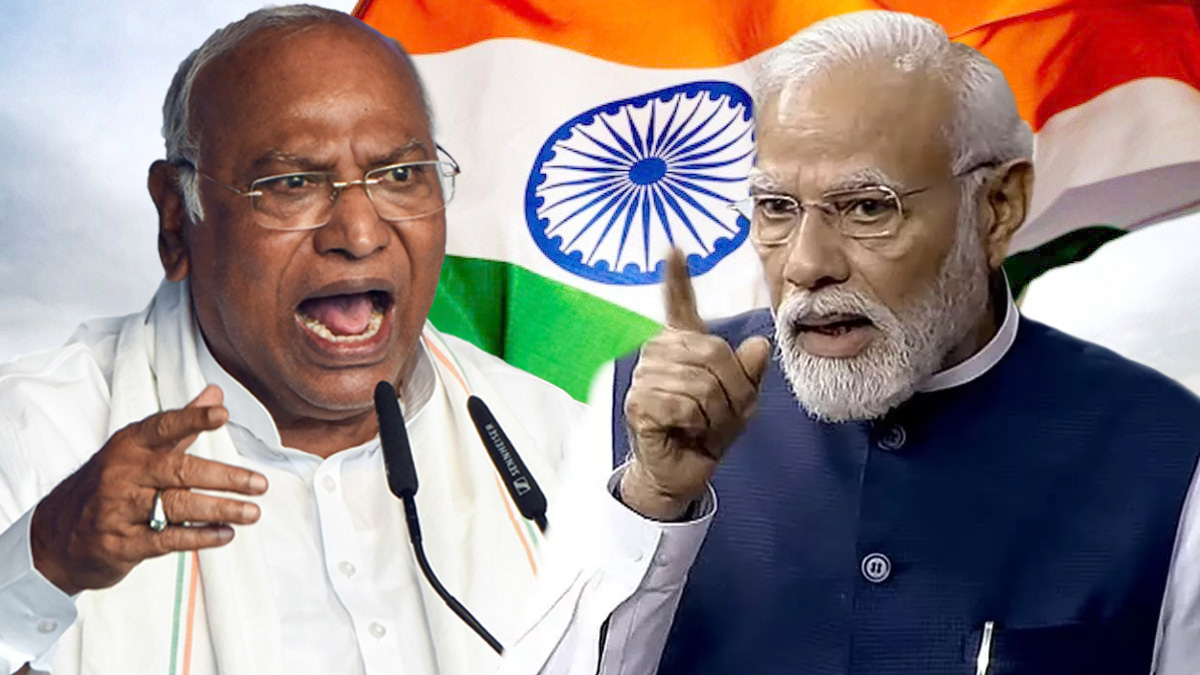
From the unveiling of electoral bond data to the long-anticipated arrest of Delhi Chief Minister Arvind Kejriwal to the surprise entries and departures in political parties, the road to the 18th Lok Sabha elections has been a whirlwind of political spins, and memes have surfaced as a potent campaigning tool.
"Memes are like magic tricks in politics, particularly for the younger generation who favour visuals over text," said Vinay Kulkarni, head of the Pune-based political digital marketing agency, Social Rajneeti.
An analysis of the official Instagram accounts of three major political parties -- Bharatiya Janata Party (7.5 million followers), Indian National Congress (3.7 million followers), and Aam Aadmi Party (1.1 million followers) -- reveals that nearly one in five posts is 'soft content'.
This term refers to the use of memes, movie posters, music, and videos edited to evoke humour or satire.
"In India, political parties want to portray their leaders as cinematic heroes critical of their opponents. This is where memes come into play," said Niranjan R, a political consultant and founder of Political Analytics-India (PA-I).
The BJP's official Instagram account has launched two campaigns targeting the INDIA bloc: 'Ghamandiya' and 'Raavan Dahan' (videos featuring the faces of INDIA bloc leaders on a single head).
Memes using keywords like 'vasooli', chande ka dhandha', and 'tanaashah' (dictator) are circulating on the official Instagram handles of various Opposition parties.
"The Congress has been creating memes to highlight the Narendra Modi government's failures. We believe that memes play a crucial role in conveying our messages to younger audiences," said Vaibhav Walia, chairman of the Congress' communication war-room 2024.
Strategic consumption
Experts argue that political parties use memes for more than just attracting attention.
"They (memes) simplify complex issues, making them easier to understand," said Kulkarni. He further said memes spread rapidly online, helping political parties engage young people with their campaigns.
Niranjan, based in Tamil Nadu, noted that memes are particularly useful when language barriers exist.
"A small text or a voiceover on a leader's photo or video can make it relatable," he explained.
Stickers and graphics on WhatsApp with the help of tools like Tenor GIF keyboard assist in making such content more accessible.
However, Kulkarni warned that while supporters crave memes, leaders must exercise caution to avoid potential backlash.
Vikash Sarah, a social media coordinator at the Indian Youth Congress, observed that while political memes have a wide reach, they can detract from the seriousness of an issue.
"Sometimes meme-based choices are impulsive and may lack critical thinking," Sarah further said.
Another consumption pattern suggests that hard political content can be repulsive.
"When it is hidden behind a meme, it is far more acceptable," noted a political satirist who goes by the name of Dr Medusa on social media platforms X and YouTube, adding that sometimes influencers portray themselves as apolitical groups and then slowly start infusing political angle to so-called 'explanatory' or 'funny' videos.
Setting narratives
According to Harish Bijoor, founder of Harish Bijoor Consults, a Bengaluru-based brand and business strategy consultancy, memes can significantly influence political narratives.
"An image is created through investment, hard work, and integrity. It can be easily undermined by memes. They may seem fun, but they are serious business," Bijoor said.
In India, a country with over 360 million Instagram users -- the highest in the world -- content often goes viral online before impacting the ground reality.
"The popularity of terms like 'Pappu' and 'Pannauti' for political leaders starts on social media, said Dr Medusa.
Initiatives like the National Creators Awards and the presence of Cabinet ministers at shows hosted by influencers, Dr Medusa added, are big signs that political parties are relying hugely on soft content.
Grey area
The race for creativity, the accessibility of tools, and the urgency of elections often blur the line between what is humorous and what is offensive.
There have been instances of comedy groups and pages being sued for producing and sharing 'defamatory' content against political groups. However, the vast reach of the Internet still places memes in a grey area.
"Although it's challenging for political parties to track every meme, legal hiring does increase during election campaigning, and defamation notices are sent across parties," said Abhijat Bhardwaj, a Delhi-based lawyer with over seven years of experience in the field.
He highlighted that finding the originator is difficult in this digital age, but noted: "The Supreme Court, in many legal precedents, has taken a stern view and held that merely 'sharing' an offensive meme falls under the broad umbrella of defamation."
Photograph curated by Manisha Kotian/Rediff.com
Feature Presentation: Rajesh Alva/Rediff.com
